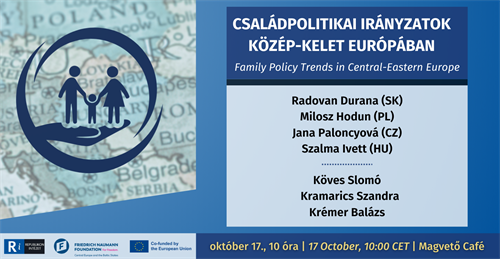

On 17 October 2023 Republikon Institute – supported by the Friedrich Naumann Foundation for Freedom – held a conference on Family Policy Trends in Central-Eastern Europe. The event consisted of two panel discussions with experts from Hungary and the V4 countries. They discussed the current state and the future prospects of family policies in these four countries.
Andrea Virág, the Director of Strategy mentioned in her opening speech that she thinks it is crucial to keep a liberal attitude when talking about family policies, as right-wing conservative parties had been trying to monopolize this area for the past couple of years, while only focusing on their own values.
Following her speech, Daniela Matousová, the Project Manager of the Friedrich Naumann Foundation talked about the importance of family policies, even though they are often overshadowed by other topics. She also highlighted the fact that increasing the birth rate won’t solve all social issues, a certain environment also needs to be provided. An environment with free education and a labour market that provides opportunities and support to parents, regardless of whether they are traditional, single-parent or rainbow families.
First panel: Liberal Family Policies in Central-Eastern Europe
Radovan Durana analyst at INESS (SK) began by stating that family policies had become one of the main topics in Slovakian politics over the last ten years. He attributed this, among other things to the large number of conservatives in Slovakia. Then he talked about the benefits families get from the government, arguing that this system has a high opportunity cost and it leaves significantly less resources to other groups in need of support. In his opinion family policies are very costly, but not necessarily effective, arguing that maybe the system of redistribution needs to be reconsidered.
Jana Paloncyová, Head of Department for Family Policy Issues, Research Institute for Labour and Social Affairs (CZ) talked about the new Czech Strategy on Family Policies, which is quite liberal and had been prepared while consulting with experts and NGOs. In this new Strategy „family” isn’t defined, so its interpretation can be extended -among others - to non-married couples, single-parents and rainbow families.
Milosz Hodun, expert at Nowoczesna (PL) argued that family policy is just a slogen to the Polish government and has become one of the main elements of the campaign of PiS since 2015. He added that in recent years family policy focused solely on increasing the birth rate, disregarding a number of important factors. The ruling party had no long-term goals, they only focused on the short-term benefit of gaining voters.
Szalma Ivett, Senior Research Fellow of the Hungarian Academy of Sciences, Centre of Social Sciences, Head of Research Group on Reproductive Decisions (HU) argued that the measures of the Hungarian government should be called „population policy” instead of family policy, as their only goal is increasing the population. However, the Hungarian government only focuses on one aspect of population policy – namely the birth rate – while completely ignoring numbers of the death rate and immigration.
Second Panel: Hungarian Family Polcy: Goals, Tools, Performance
Szandra Kramarics, social policy expert talked about population policy, which is the main goal of Hungarian family policy. This is a tendency that has always been present in Hungary. Among the reasons for this she mentioned historical events of population loss, such as the Treaty of Trianon and wars. She added, while family policy could have a number of potential goals – such as the eradication of child poverty and promoting gender equality – the current Hungarian policy only focuses on sustaining families and the traditional family model.
Balázs Krémer, sociologist, socio-political scientist, associate professor (OR-ZSE) talked about the number of interpretations for the phrase ’Family Policy’: it can be interpreted as a population policy, a child support policy (extending the definition – among others – to the matter of genders). He thinks that there is no actual family policy in Eastern Europe, because in this region it is interpreted as an exclusive, somewhat racist marriage policy. He raised a question: can the government influence birth rate? His answer was no. He argued that benefits from the government don’t have much impact. According to him, it is the births’ distribution over time that can be influenced.
Köves Slomó, rabbi, Chief Rabbi of the Unified Hungarian Jewish Congregation talked about how the state and family are linked and the way they influence a person’s life. He thinks while the former is not indispensable in a person’s life, the latter is. He also pointed out that the current birth rate in Israel is outstanding. Then he talked about the many different aspects of having children, among others the economic impact it has on a family. He thinks that the state has a responsibility in helping with the social inequalities resulting from the cost of having children.

![]()
Co-funded by the European Union. Views and opinions expressed are however those of the author(s) only and do not necessarily reflect those of the European Union. Neither the European Union nor the granting authority can be held responsible for them.





